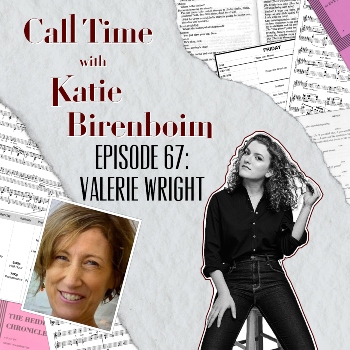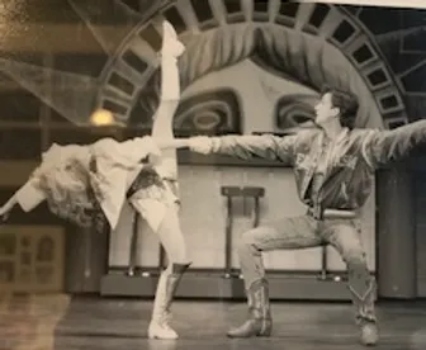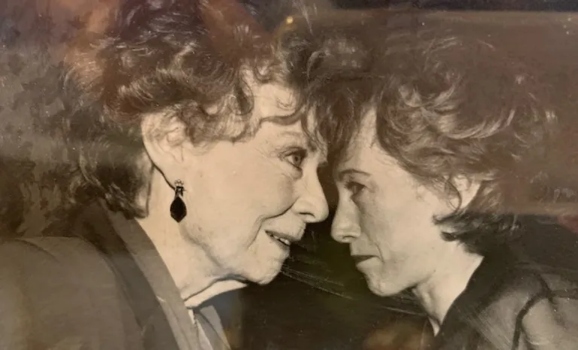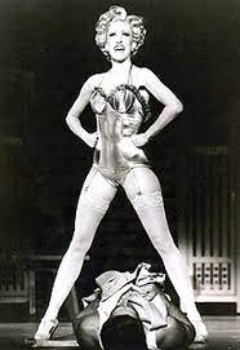
This week, I had the absolute pleasure of sitting down with Broadway legend and triple — nay, quadruple — threat performer, Valerie Wright, for an in-depth conversation on the podcast.
As I say at the start of our discussion, they don’t make ’em quite like Valerie (or “Val” as many of her friends call her) anymore: she’s a consummate Broadway performer who’s appeared in nine Broadway shows, including both of the musicals for which Bernadette Peters won her Tonys (she tells me with obvious pride on the podcast), four extremely successful National Tours (including the acclaimed 90s revival of Damn Yankees, where she starred alongside the late Jerry Lewis as Lola), countless regional and Off-Broadway productions; she’s as comfortable behind the scenes as she is onstage, and, as she tells me on the podcast, immediately after graduating from college she “sold [her] car and bought a one-way ticket to NYC,” where she promptly began working at New York Health and Racquet Club and waitressing at a restaurant on Bleecker Street (“I was terrible!” Val insists. “I was the worst waitress in the world!”). She tells me how, from there, it was the Hello Dolly! National Tour — with Carol Channing no less — a dinner theatre in Jacksonville, Florida, and, then, a call about Cats on Broadway. She booked the show a few weeks later on the Winter Garden stage.

Even after that, when I asked Val about taking on principal roles in addition to classic dance tracks, Val speaks about her career — and the theatre in general — with a sort of can-do attitude. You get the sense she shaped some of these remarkable professional experiences out of sheer will-power and talent. “There was no roadmap,” she reminds me on the podcast, “you got there and you just literally figured it out however you could, and you just scraped through and watched other girls, and saw how they dressed and listened to what they sang.” “I did Cats,” Val goes on to explain, “then I did Song and Dance — back to back dance shows. And I started to feel like, even though I wasn’t really super savvy, I think I was getting a sense that if I wanted to do things the way I wanted to do them, I was going to maybe have to curate that on my own, or people were gonna see me only as a dancer. [So I heard] they were doing On the Town at Arena Stage, and I said [to myself]: I want that part. I’m gonna get that part. Get out of my way; I’m gonna get that part…I even got called back for Jerome Robbins Broadway, and I said, I’m not going to go in…Because I knew I didn’t want to just dance.”
This determination, resourcefulness, and work ethic stood Valerie in good stead. Indeed, Val insists to me on the podcast that “longevity” in the theatre is simply “based on your staying power.” “If you can endure it,” she explains, “and if you can stay employed enough to be encouraged, you’ll hang around.” And Valerie’s website is littered — particularly in her “gallery” section — with other theatre legends who “stuck around,” a veritable Who’s Who of Broadway: artists, and “great friends” of Val’s like, Susan Stroman, Bernadette Peters, Tom Wopat, the late Marin Mazzie, Charlotte D’Amboise, Karen Ziemba, Casey Nicholaw, Jeanine Tesori, Kristin Chenoweth, even the great Gwen Verdon. I should mention here, too, that Valerie’s performance as Dolly Tate, and the whole, 1999 production of Annie Get Your Gun literally made me want to go into theatre when I saw it at four years old.

Through her theatre friends, her extensive resumé, her personal and professional history, as well as her general outlook on life, Val seems to embody what I can only describe as a sort of “three bucks, two bags, one me” mentality, by which people moved to the city from all across the country with nothing, scraped by waitressing and living in railroad apartments filled with roaches (and friends), worked hard, took class, booked dinner theatre, got their hearts broken, auditioned, and generally figured it out on their own until maybe they struck gold — or out of their own sheer will — they made it to a Broadway stage.
On the podcast, I call it a less “sanitized” version of Broadway; Val calls it a “clumsier and scrappier” theatrical — and growing up — experience. Now, of course, many people have an experience similar to the one Val had breaking into, and shaping a career in, the theatre industry. But I would wager that the average “coming to New York to become a theatre actor” experience looks and feels pretty different today because of a variety of factors, including, but not limited to: the rise of the BFA musical theatre program, the Disney-fication of Broadway, the internet and social media, as well as movies and TV shows like Glee, High School Musical, and, my personal favorite, Smash.
While this era is interesting in its own way, I have always been intrigued by the scrappy, “fake it til you make it,” dirty, dingy, irreverent, fun Broadway of yesteryear. “You have to remember,” Val says when I tell her I feel like Broadway is so “sanitized” now, “we were in an era of things that were brand new. We were of an era, it happened a couple decades before, but we were in an era where a whole new dance style emerged based on a choreographer [Fosse]. Nobody had seen anything like it. So we were experiencing standard theatre changing experiences. Of course, A Chorus Line changed everything. So did Dreamgirls. Those were the kinds of things that my group was riding in on. And the roadmap for kids now is changed on so many levels.”
For admirers of this version of the theatre landscape, Val gives some very solid advice (“set a timer on your phone for social media”). But there’s something else that has to do with this question of Old Broadway vs. New Broadway which I’m able to articulate in my conversation with Val: even if you don’t take Val’s advice about social media, if you’re interested in her career, and the kinds of careers of her peers, just having that conversation with her is worthwhile. We have so much to learn from other generations of theatre artists — and vice versa, as Val explains on the show. “I love youth,” she says, “the Gypsy cast and the Kim cast” (Valerie is a cover for the titular role in Kimberly Akimbo on Broadway, which just won the Best Musical Tony), “are the same…it’s 60-year-olds, a 40-year-old, and everyone else is in their twenties.” And full disclosure — if you can’t already tell in listening to the podcast — I consider Val a dear friend. We spent many a night up at Goodspeed laughing and talking — often about “Old Broadway” — into the wee hours of the morning (probably far later than we should have).
And that’s one thing I love about theatre that I think you can’t find in other work environments: as I say on the podcast, because theatre isn’t all that hierarchical — if you and Val are cast in the same show, even if Val is Val and is a veritable Broadway legend with tons of shows under her belt, and you are in your twenties and just starting out — you are for all intents and purposes the same: you’re both actors in a show. It makes it so much easier to cultivate intergenerational friendships, from which (clearly) we can learn so much. And beyond learning, these friendships can give — and add — so much to your life: I know they have to mine. The intergenerational friendships I’ve made in the theatre, with people like Val and others, are some of my most treasured connections in life, and I just don’t think you can get them from most other professional environments. And — yes — they provide a bridge, and a connection, to that scrappier, clumsier, dirtier, funnier, more unique version of New York theatre that made me fall in love in the first place.
I ask Val on the show whether she likes the term “Broadway baby”…in the Sondheimian sense of the phrase (“I’m just a Broadway baby…walking off my tired feet; pounding forty second street to be in a show”). She, of course, embraced it, and added her own term (“old school”). I use the phrase with all the reverence and love in the world: she’s danced for Gwen Verdon, starred alongside Jerry Lewis, been the “worst waitress in the world,” directed and choreographed, written a children’s album, and continues to forge intergenerational friendships with theatre artists of all ages and backgrounds, stay up into the wee hours of the morning talking, and shape her career by sheer force of will, talent, and grace. THAT is a Broadway Baby, by any definition.

Listen to our whole conversation, where we also cover compliments, watching Bernadette Peters from the catwalk, finding your “belt,” specificity, directing and choreographing, and raising a family in the theatre. And if you want an extra treat: watch Valerie perform “A Little Brains, A Little Talent” on the Damn Yankees National Tour and you’ll see what I mean about her effortlessness, specificity, and “old school” Broadway charm. That’s one thing for which we can thank social media and the internet!


Leave a Reply